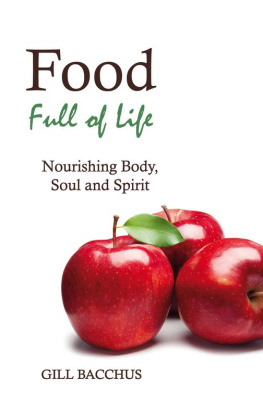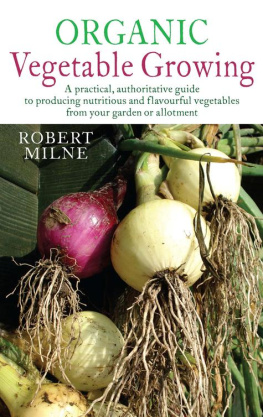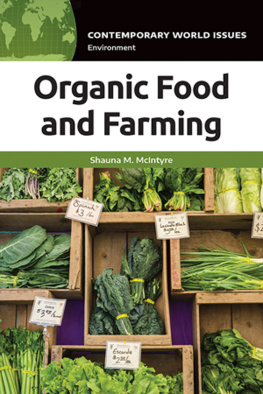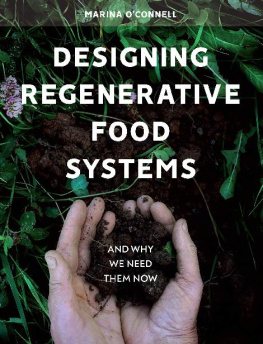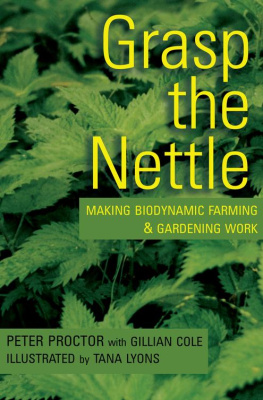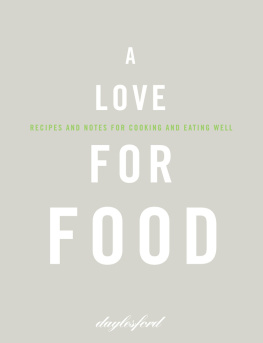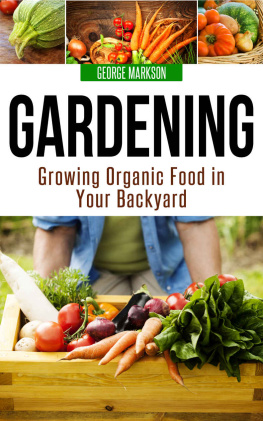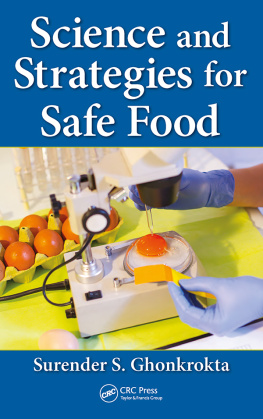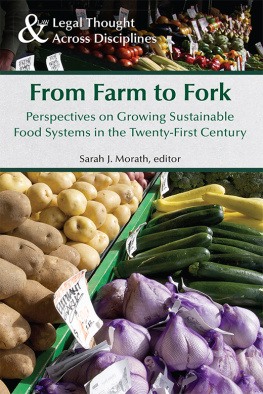Dedicated to my grandchildren, Alistair, Andrew, Sarah and Jodie and to all the children yet to be born whose health will be affected by the quality of the food their parents and grandparents choose to eat.
I would like to thank my husband, Peter Bacchus for his encouragement and help with his biodynamic farming knowledge in discussing and reviewing aspects of this book. Also Lis Alington, Gwenyth Wright and Christine Growse for their proof reading and comments. Thank you to Wendy Cook for her encouragement and her demonstration of exciting dishes made with organic food.
I thank Katy Waite for her line drawings and encouragement, and all the authors and publishers for permission to reproduce the illustrations.
Thank you to the pioneering organic and biodynamic farmers who have demonstrated how high quality organic food can be grown profitably, particularly to those mentioned in this book: Ray and Jenny Ridings, James and Annie Millton, Ian Henderson and his family, Dorothea Leber at Michael Hall School gardens, Ewen and Jan Willis of Fruit Forest farm, and the staff at Loch Arthur Camphill Community Farm and Laverstoke Park. To other members of the Biodynamic Farming and Gardening Association of New Zealand and Taruna College for teaching me about biodynamic farming and particularly to Peter Procter, Hans Mulder and Glen Atkinson, and to David Wright for his assistance.
I would like to acknowledge the assistance of Professor Mike Hedley and the late Dr Neil Macgregor of Massey University, New Zealand, with my research and literature search which I drew on for this book. I also drew inspiration and guidance from the research on inner quality of fruit and vegetables by Joke Bloksma and her colleagues at the Louis Bolk Institute, Netherlands.
Thank you to Sally Polson and Christopher Moore of Floris Books for their editorial assistance with the manuscript.
In this book I invite you to think about the quality of the food you eat. We often take a lot of trouble to select and prepare food to look attractive and desirable. Does it also leave you feeling satisfied for some time after eating it, and does it contribute to your health?
The effects on our health of the food we eat are now generally accepted. Food allergies, cancer, skin disorders, attention deficit and autism can often be helped by changing diet and improving nutrition. Emotional and mental states and intelligence have also been linked to diet. People are exploring specific diets and some eat according to metabolic and blood group type to improve their health. Consumption of dietary supplements and food fortification are increasing. But shouldnt we be getting most of our nutritional requirements from our food? In New Zealand and elsewhere, the Five-a-Day campaign encourages people to eat at least five servings of fruit and vegetables a day. The USDA Food Guide recommends up to thirteen servings per day for some people. We recognise that eating fruit and vegetables helps to alleviate problems such as obesity, diabetes and cardiovascular disease.
Food nutritional value is generally assessed by how much of the essential nutrients the food contains. Diets are generally chosen according to standard average nutrient content of each component. But nutrient content and taste in fruit and vegetables vary considerably, according to how and where they are grown. Modern farming methods, contamination of food crops with pesticides and nitrates, and genetic modification have all contributed to concerns about poor food quality. Farmers and growers are using increasing quantities of nitrogen fertilisers for larger crop yields. This can reduce the quantity of other nutrients in the crops and can also adversely affect other food attributes. Many minor nutrients such as silicon, copper and boron have important effects on how plants grow and the nutritional quality of food products, and these elements are often lacking in our soils.
I became interested in how growing methods affect food nutritional value when working as a policy analysis for the New Zealand Ministry of Agriculture. I was asked to read and make a summary of public submissions on a proposed policy for organic farming. Many of those submissions claimed that food grown in this way is higher quality and better for our health than food grown by conventional means with fertilisers and chemical sprays. This led me to investigate what scientific evidence there is to back up such claims. Many scientists maintain that no nutritional superiority of naturally grown or organic food has been established, yet a growing number of people say that they feel better and are healthier when eating organic food.
I was particularly interested to learn about the biodynamic farming system, which is based on concepts introduced by Rudolf Steiner, the Austrian scientist, philosopher and educator. Steiner also gave lectures on nutrition. These lectures, and books written by several doctors and scientists who further developed the concepts, provide a very different view of nutrition from those still commonly accepted. They advocate looking at energy processes that maintain life in plants and animals rather than measuring nutrient levels. After pondering these ideas for many years, and finding more and more evidence from other fields such as quantum physics, that provide similar concepts, I believe they are very pertinent to some of our nutritional and medical challenges.
The biodynamic farming system aims to balance the energies flowing up into plants from the soil and nutrients with energies flowing in from the sun, planets and stars. These energies were known to investigators in medieval times and now quantum scientists are seeing their effects. Biodynamic farmers spray a silica (silicon) preparation on to plants to help them absorb the light energies from sun and stars. I became interested in how this very dilute silica spray affects plants and their nutritional value, and tested its effects on lettuce nutrient contents for a Master of Science degree. I found some apparent effects, but because of large variations between plants and the small number of treatment replications, few of the results were statistically significant. I think a better designed investigation could provide more conclusive results. More recently scientists have been discovering important roles of silica in plant nutrition and human health. It appears to have a key role in improving protein quality and bringing more light energy into plants. We have a lot more to learn about how silica and light convey organisational energy to plants and soil.
My interest in alternative aspects of nutrition was stimulated, as for many people, when I had a brush with cancer. I realised that my eating habits had helped to make me sick. Exploring information about nutrition, I happened to listen to an old tape of a lecture by Ehrenfried Pfeiffer, a German nutrition scientist who worked for many years in the USA. He asserted that many of our health problems relate to a shortage of light in our food. This started me on a long journey of exploration to find out what he meant.
There are many phenomena that some people consider part of reality while sceptics dismiss them as unverifiable and not real. These include religious doctrines, astrology and homeopathy. After a conventional scientific education I have struggled for years to reconcile what I instinctively believe to be true with what science has shown to be true. I have gradually become more convinced that there is more to life than what we can see and measure by conventional science. Some people are healed through religious belief and others are healed through homeopathy. Homeopathically prepared sprays (containing no measurable matter) have a measurable effect on plant growth. Many dairy farmers use homeopathic remedies to heal their cattle. The cattle are unaware of the debate about whether they work or not!

